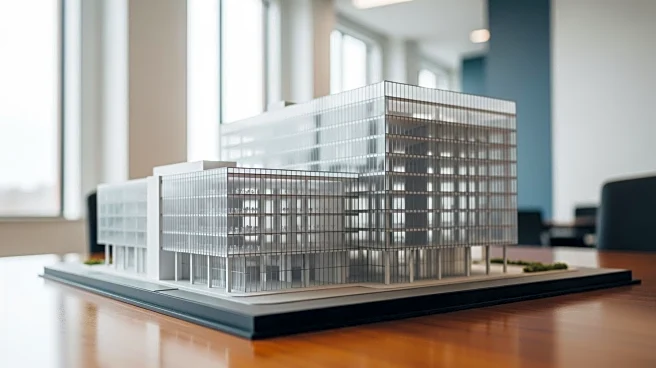What's Happening?
Ford Motor Company is relocating its headquarters for the first time in 70 years, moving to a newly constructed facility in Dearborn, Michigan. The new headquarters, named Ford World Headquarters, is part of a larger campus called Henry Ford II World Center.
This move is designed to reflect Ford's vision of being a forward-looking company, focusing on modern design and collaboration. The new facility includes a showroom described as resembling a 'James Bond villain's lair,' and features seven restaurants, office spaces, design studios, and fabrication shops. The relocation aims to attract new talent, particularly in software engineering and AI, by offering a modern work environment. The current headquarters, known as 'The Glass House,' will be demolished, and the move is expected to be completed by 2027.
Why It's Important?
The relocation of Ford's headquarters signifies a strategic shift towards modernity and innovation, aligning with the company's goals to be seen as a leader in software and AI. This move is crucial for Ford as it competes for top talent in these fields, which are essential for the company's future growth and development. By creating a workspace that fosters collaboration and innovation, Ford aims to enhance its competitive edge in the automotive industry. The new headquarters also reflects a broader trend among automakers to modernize their operations and appeal to a new generation of employees who expect cutting-edge work environments.
What's Next?
Ford's new headquarters is set to be fully operational within two years, with more than 14,000 employees located within a seven-minute walk and another 9,000 within a nine-minute drive. The company plans to host a grand-opening celebration for the new facility, marking a significant milestone in its transformation. As Ford continues to develop its new headquarters, it will likely focus on integrating advanced technologies and fostering a culture of innovation. The move may also prompt other automakers to reevaluate their own headquarters and consider similar upgrades to remain competitive in attracting top talent.
Beyond the Headlines
Ford's decision to relocate its headquarters and focus on modern design and collaboration highlights the evolving nature of the automotive industry, where traditional manufacturing is increasingly intertwined with technology and innovation. This shift may lead to broader changes in corporate culture and operations, as companies strive to balance their legacy with the demands of a rapidly changing market. The emphasis on attracting software engineers and AI experts underscores the growing importance of these fields in shaping the future of transportation and mobility.
















